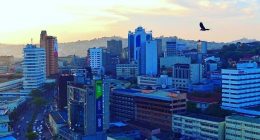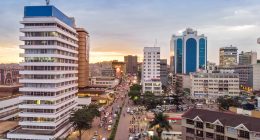Editor’s note: this article is part of the “Covid-19 Reset” project, where the LéO Africa Institute is asking its fellows and associates to imagine a new, progressive post-covid world for our respective communities and countries.
***
Trump leads the United States. Boris Johnson is Prime Minister of Britain and Christine Le Pen came close to a glorious upset of the establishment in France. Hulking above them is Vladimir Putin. It is hard to believe that globalization would have taken a kick in the teeth worse than the above quartet could deliver. Harder still, is to imagine that the coronavirus pandemic, that started in Wuhan, Hubei province, China, in late 2019, could upend the world in the way it has. For many, our lifetime may as well be split into two: life before the coronavirus and life after it.
In a pandemic, data is king
In China, another strongman, Xi Jinping, rules the Chinese with an AI fist. Iron fists are so 19th century!
The dramatic unfolding of the World Order by the most insidious faceless enemy out of Wuhan in China’s Hubei Province revealed uncomfortable biases, prejudices, truths, and the still primal nature of man in the third decade of the 21st century. Fights over toiletries or naming the virus; countries alleged to confiscate medical supplies meant for others; the deportation of diseased aliens across borders; alliances stretched by lack of common approaches to fighting the disease; and the realization that home still matters for most.
Above all, the response revealed that in response to all epoch-defining moments—you can stretch that back to the Great Depression of 1929, the fall of the Berlin wall, to 9/11—one key ingredient is useful: information.
Information, its reception, synthesis, application, collection, dissemination, and even concealment in some cases, determined whether countries or communities were successful at containing the spread of the highly infectious COVID-19 or not. It also is, when defined as data or Big Data, the industry that is going to define all others. It is the currency of the times.
To take an example of Uganda, it was quite the sight watching government officials try to supply food to an estimated 1.5 million people, alleged to be vulnerable or economically disadvantaged—to help them survive the harsh lockdown measures—within the Greater Kampala Metro area. The process of arriving at that figure should have been simple, after all, we have the Uganda Bureau of Statistics with numerous bright-eyed individuals paid to number crunch and report on such trends.
What was more revealing, though, and which is important for many an African country (though as a result of its poor contact tracing, Great? Britain shall be considered one), is that it is one thing producing copious amounts of information, and a different piece of cake using, making that useful, storing and being able to retrieve the same for efficient and effective utilization.
The pace of distribution of food in Kampala was a vivid portrayal of this. We know the numbers of poor/vulnerable people. We have a whole National Identification and Registration Authority; have just spent $167 million on a CCTV system; have a police database; Health Management Information System; over 12 million bank accounts; close to 30 million mobile phone subscriptions; and at least 21 million mobile money accounts. You would think we would know how to use all this information. We did not!
Data is going to be the currency of the next world, anyway, just like the steam engine steam-rolled through the 18th, and diesel through the late 19th and early 20th, with petrol giving way to Jet A-1 fuel by the end of the 20th century.
The smart local entrepreneur or businessman who figures that out will be in business for long.
The future is in the sky
The surprising number of planes that kept flying even amidst the so-called lockdowns underpins both their importance to the world and the fact that air travel will remain a necessary evil. Air travel is so important that some airports contribute double-digit percentages to the GDPs of their cities, if they are not cities in their own right.
For Africa, particularly, with only about 90 million travelers, representing just under 2% of global air passengers, air travel is virgin territory for those with a daring attitude. Barring a catastrophic event (few will surpass COVID-19 in our lifetime), Africa will have 2.5 billion people in less than 70 years. It already has an estimated 1.2 billion, majority of whom are under 30 years and very exposed by virtue of the democratizing effect of social media to a lifestyle that they increasingly demand. Air travel, the opening of borders and the Single Africa Air Travel Market portend serious opportunities for those hoping to cash in on a post-COVID-19 or with COVID-19 world. Opportunities abound for those lucky enough to be involved in aviation (not so much during this period) or living near airport cities.
Facilitated mostly by air travel, tourism, strangely, will lead to a revival of the world economies that position themselves right. Pricing, incentives, opportunities will all work to help the world’s last surviving mass employer, after manufacturing was hobbled by automation, keep a lot of economies afloat. The cabin fever as a result of the world being under lockdown for 90 days for most people, means that there will be an almost whimsical, you only live once dash to any and every place, far, near outside borders or within borders. This will include places people had put off visiting for long. Thus, the tourism industry shall rebound better than expected.
Revisit transport, health care, and local manufacturing
A large part of the world outside the OECD shall innovate ways of getting the basics done right. Water supply, mass transportation, street numbering, roads and rails, energy generation, these will help keep a lot of people employed and employable for at least quarter of a century.
Also read: Jobs and the Future of Work Beyond Covid19
The most exciting transport story has the 3 countries, Kenya, Tanzania, and Uganda finally getting to utilize the Lake Victoria eco-system to spur much needed economic development. Already, all 3 are busy repairing old jetties and building gigantic new ones; opening up shipyards, and in fact, transporting a lot of goods on the second-largest freshwater lake in the world. To hear the blaring horns of the ferries as they get to Masese Pier, Bukasa Port and even Port Bell, shall be the sound of rebirth to the nostalgic as well as new economic possibilities.
The insular, mean-spirited, nationalist and almost parochial reaction to the outbreak of the pandemic by most governments, means that there will be a resurgence of pharmaceutical research within borders for smart governments and direct investment in pharmaceutical plants. Coupled with this is a resurgence of interest in critical care equipment manufacture and renewed calls for investment, including incentivizing the private sector to invest more in tertiary healthcare facilities. It would not be farfetched seeing all countries strengthen National Health Insurance Schemes. If anything, COVID-19 has shown that it is possible to get things done by ourselves when we mobilize to that end. For the landlocked countries in most of Africa, this pandemic ought to be a lesson in what measures to take to assure basic survival if the worst came into play.
In order to learn valuable lessons, the right tools must be in place. The education of most especially young Africans should see a radical change to the future. If robots are going to be delivering food to patients, then that patient should learn to use a tablet to ask for their milk while still toddlers. This is a sector that never runs out of possibilities for investment. The marriage of Big data and education should make it easier to see a huge shift in the delivery of education across Africa and the world. The inventions and software to spur this EduTech revolution shall spur new “money centres”.
What a world to inherit! But, as the Good Book cautions, there is really nothing new under the sun. Just a recalibration, and lucky is s/he that knows how to do it.
Daniel B. Bwambale is an Advocate and Public Affairs Commentator









